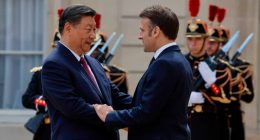
Stay informed with free updates
Simply sign up to the Electric vehicles myFT Digest — delivered directly to your inbox.
China has said it will rein in expansion of the country’s electric vehicle sector, as Beijing responds to western criticism of its industrial and trade policies that have contributed to a wave of Chinese car exports.
Xin Guobin, vice-minister of industry and information technology, said on Friday there was “insufficient” external consumer demand and that Beijing would take “forceful measures” to address “blind” construction of new EV projects by some local authorities and enterprises.
“There are also some disorderly competition behaviours,” he said.
The comments come as the electric vehicle industry, one of China’s few economic bright spots, has been thrust into a trade war between Beijing and the west.
In September the EU launched an anti-dumping investigation into the Chinese EV industry, highlighting fears that Chinese companies posed an existential threat to German, French and Italian carmakers which are struggling to compete with low-cost, high-tech imports.
Beijing hit back this month with an investigation into French cognac sales to China.
The EU investigation followed complaints that vast subsidies and bank lending from Beijing had underpinned the expansion of Chinese manufacturers.
European companies fear that China is building EV plants far beyond the levels needed to meet domestic demand, following the pattern seen in steel, aluminium and solar panel manufacturing, sectors in which China has squeezed out competition internationally.
However, Xin also slammed foreign “protectionist behaviours” and the “abuse” of trade dispute mechanisms, echoing earlier comments from Beijing over the EV probe by Brussels and sweeping US restrictions on China-made EVs and batteries.
China last year overtook Japan as the world’s biggest car exporter, largely thanks to a boost in sales of internal combustion engine vehicles to Russia and, to a lesser extent, Chinese EV sales to parts of Asia and Europe. Chinese car exports rose more than 60 per cent to nearly 5mn vehicles.
Xin reiterated Beijing’s concern with intense domestic competition but did not announce any new measures to rein in the price cutting that has beset the industry since late 2022.
Domestic sales of new-energy vehicles — which includes plug-in hybrids and pure battery EVs — rose more than 38 per cent in 2023 on the previous year to more than 9mn vehicles, according to the China Association of Automobile Manufacturers.
While foreign carmakers slow to transition to EVs have been the worst hit by intense competition in China, scores of local companies are also struggling to compete.
“The biggest concern is that the market for EVs has quickly become supersaturated and that a vicious price war is just around the corner,” Louis Gave, an expert with Gavekal Research, wrote in a research note this week.
“Now that automakers have ready access to generous bank credit, the path of least resistance is to try and gain market share and kill off competition by slashing prices and margins.”
Also Read More: World News | Entertainment News | Celeb News
FT









